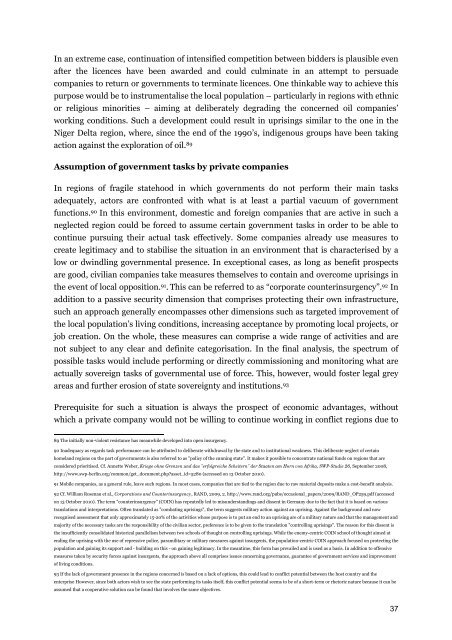PEAK OIL
PEAK OIL
PEAK OIL
You also want an ePaper? Increase the reach of your titles
YUMPU automatically turns print PDFs into web optimized ePapers that Google loves.
In an extreme case, continuation of intensified competition between bidders is plausible even<br />
after the licences have been awarded and could culminate in an attempt to persuade<br />
companies to return or governments to terminate licences. One thinkable way to achieve this<br />
purpose would be to instrumentalise the local population – particularly in regions with ethnic<br />
or religious minorities – aiming at deliberately degrading the concerned oil companies’<br />
working conditions. Such a development could result in uprisings similar to the one in the<br />
Niger Delta region, where, since the end of the 1990’s, indigenous groups have been taking<br />
action against the exploration of oil. 89<br />
Assumption of government tasks by private companies<br />
In regions of fragile statehood in which governments do not perform their main tasks<br />
adequately, actors are confronted with what is at least a partial vacuum of government<br />
functions. 90 In this environment, domestic and foreign companies that are active in such a<br />
neglected region could be forced to assume certain government tasks in order to be able to<br />
continue pursuing their actual task effectively. Some companies already use measures to<br />
create legitimacy and to stabilise the situation in an environment that is characterised by a<br />
low or dwindling governmental presence. In exceptional cases, as long as benefit prospects<br />
are good, civilian companies take measures themselves to contain and overcome uprisings in<br />
the event of local opposition. 91 . This can be referred to as “corporate counterinsurgency”. 92 In<br />
addition to a passive security dimension that comprises protecting their own infrastructure,<br />
such an approach generally encompasses other dimensions such as targeted improvement of<br />
the local population’s living conditions, increasing acceptance by promoting local projects, or<br />
job creation. On the whole, these measures can comprise a wide range of activities and are<br />
not subject to any clear and definite categorisation. In the final analysis, the spectrum of<br />
possible tasks would include performing or directly commissioning and monitoring what are<br />
actually sovereign tasks of governmental use of force. This, however, would foster legal grey<br />
areas and further erosion of state sovereignty and institutions. 93<br />
Prerequisite for such a situation is always the prospect of economic advantages, without<br />
which a private company would not be willing to continue working in conflict regions due to<br />
89 The initially non-violent resistance has meanwhile developed into open insurgency.<br />
90 Inadequacy as regards task performance can be attributed to deliberate withdrawal by the state and to institutional weakness. This deliberate neglect of certain<br />
homeland regions on the part of governments is also referred to as "policy of the cunning state". It makes it possible to concentrate national funds on regions that are<br />
considered prioritised. Cf. Annette Weber, Kriege ohne Grenzen und das "erfolgreiche Scheitern" der Staaten am Horn von Afrika, SWP-Studie 26, September 2008,<br />
http://www.swp-berlin.org/common/get_document.php?asset_id=5280 (accessed on 13 October 2010).<br />
91 Mobile companies, as a general rule, leave such regions. In most cases, companies that are tied to the region due to raw material deposits make a cost-benefit analysis.<br />
92 Cf. William Rosenau et al., Corporations and Counterinsurgency, RAND, 2009, 2. http://www.rand.org/pubs/occasional_papers/2009/RAND_OP259.pdf (accessed<br />
on 13 October 2010). The term "counterinsurgency" (COIN) has repeatedly led to misunderstandings and dissent in Germany due to the fact that it is based on various<br />
translations and interpretations. Often translated as "combating uprisings", the term suggests military action against an uprising. Against the background and now<br />
recognised assessment that only approximately 15-20% of the activities whose purpose is to put an end to an uprising are of a military nature and that the management and<br />
majority of the necessary tasks are the responsibility of the civilian sector, preference is to be given to the translation "controlling uprisings". The reason for this dissent is<br />
the insufficiently consolidated historical parallelism between two schools of thought on controlling uprisings. While the enemy-centric COIN school of thought aimed at<br />
ending the uprising with the use of repressive police, paramilitary or military measures against insurgents, the population-centric COIN approach focused on protecting the<br />
population and gaining its support and - building on this - on gaining legitimacy. In the meantime, this form has prevailed and is used as a basis. In addition to offensive<br />
measures taken by security forces against insurgents, the approach above all comprises issues concerning governance, guarantee of government services and improvement<br />
of living conditions.<br />
93 If the lack of government presence in the regions concerned is based on a lack of options, this could lead to conflict potential between the host country and the<br />
enterprise However, since both actors wish to see the state performing its tasks itself, this conflict potential seems to be of a short-term or rhetoric nature because it can be<br />
assumed that a cooperative solution can be found that involves the same objectives.<br />
37


